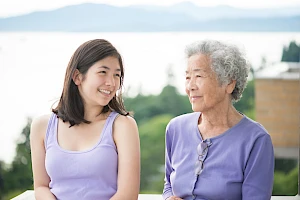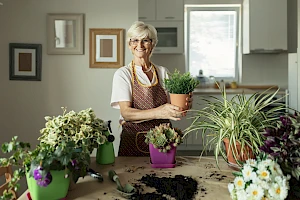-
5 Myths About Bone Health That Makes Caregiving Harder
June 7, 2024
Debunking five myths about bone health in seniors can make caregiving easier. Learn about common misconceptions and how to better care for senior loved ones.
-
Helping Seniors with Mobility Challenges
June 6, 2024
Discover tips and strategies for assisting Canadian seniors with mobility challenges to enhance their quality of life and independence.
-
Managing Diabetes with Nutrition: A Guide for Canadian Seniors
June 1, 2024
Discover practical nutritional tips and guidelines to help Canadian seniors manage diabetes effectively. Learn how a balanced diet can improve your health and quality of life.
-
Innovative VA Programs: Supporting Senior Veterans in Care
May 26, 2024
Explore innovative VA programs that support senior veterans in care, providing them with the resources and assistance they need for a better quality of life.
-
Sunlight Benefits: Promoting Healthy Exposure in Senior Care
May 25, 2024
Discover the benefits of sunlight exposure for seniors in care homes and learn tips to promote healthy and safe sun exposure.
-
Spring Cleaning Tips for Seniors: How Caregivers Can Provide Support
May 6, 2024
Springtime brings a sense of renewal and freshness. It's the perfect time to engage in the age-old tradition of spring cleaning, but for seniors, this task can be daunting. Thankfully, with the support of caregivers, elderly individuals can tackle spring cleaning with ease and efficiency. Let's explore some helpful spring cleaning tips tailored specifically for seniors, along with ways caregivers can lend a helping hand.
-
Senior Helpers Canada Expands to the West Coast
April 22, 2024
As the demand for quality senior care continues to grow, so does the need for compassionate and reliable services. In an exciting development, Senior Helpers is thrilled to announce the opening of our newest location in Vancouver, British Columbia. This expansion marks a significant milestone in our journey to provide exceptional care to seniors across Canada, extending our brand presence to the vibrant west coast.
-
3 Gardening Ideas for Seniors with Low Mobility
April 17, 2024
Maximize the benefits of gardening with our helpful and easy-to-adopt ideas for seniors with limited mobility.
-
Managing Diabetes with Nutrition: A Guide for Seniors
April 1, 2024
Living with diabetes as a senior doesn't just involve following a list of medical dos and don'ts; it's about weaving healthier choices into the tapestry of life's long-held habits and pleasures. It's recognizing that every meal is an opportunity to nourish not just the body, but also the soul.
-
Diet Tips: Seniors with Health Conditions
March 16, 2024
A balanced diet is fundamental for maintaining overall health and plays a critical role in managing conditions like diabetes, heart disease, and hypertension in seniors. As a family caregiver, it is important to be aware of the dietary requirements of seniors to provide them with the best care possible.
-
Understanding and Addressing Eating Disorders in Seniors
February 26, 2024
Eating disorders are often mistakenly considered to be exclusive to younger age groups, but the reality is quite different. Seniors are increasingly affected by these conditions, which can be both a continuation of earlier life struggles or arise anew in later years. Here, we'll explore the signs, causes, and effective management of eating disorders in seniors, with a focus on how caregivers can provide essential support.
-
What to Do if you Think You're Having a Heart Attack
February 15, 2024
Understanding the signs of a heart attack in seniors and knowing how to react is critical. This is especially true for seniors who are aware they are at high risk, or even those who might be experiencing a mild heart attack right now. In this guide, we provide a clear, easy-to-follow sequence of steps to take if you believe you or a loved one is having a heart attack.
-
Budgeting Tips for Seniors
January 28, 2024
In the ever-evolving financial landscape of 2024, seniors face unique challenges and opportunities. Below offers practical budgeting suggestions tailored for seniors in 2024, helping navigate the intricacies of modern financial management.
-
A Guide to Supporting Seniors During Winter Season
January 17, 2024
During winter, it's essential to extend a caring hand to our elderly loved ones who may face unique challenges during this season. From the harsh weather conditions to the potential for isolation, the winter months can be especially tough for seniors.
-
A New Year, A New You: Practical Self-Care Ideas for Caregivers
January 2, 2024
As we usher in a new year, many are setting resolutions to prioritize self-care and well-being. For caregivers, who often put the needs of others before their own, embracing self-care is crucial for maintaining physical and mental health. Understanding it's importance, let's explore practical ideas to help caregivers kickstart their self-care New Year's resolution goals.
-
Managing Heart Health for Seniors During the Holidays
December 18, 2023
The holiday season brings joy, cheer, and a host of health challenges for seniors. It's a time replete with decadent treats, disrupted routines, and, at times, emotional stress, which can all contribute to potential holiday heart health complications for seniors.
-
Holiday Celebration Ideas for Seniors with Dementia
December 7, 2023
The holiday season, full of joy and celebration for many is here. However, for seniors with dementia, the hustle and bustle can be overwhelming. Creating a peaceful and comforting environment is essential to ensure they can enjoy the festivities without stress. Let's explore some thoughtful holiday celebration ideas tailored to seniors with dementia.
-
Winter Ready: The Best Winter Boots for Seniors to Stay Safe and Cozy
November 21, 2023
For many, winter is welcomed season, but the cold temperatures and slippery surfaces can pose challenges, especially for seniors. One essential element of winter preparedness is investing in the right pair of winter boots. In order do so, let's explore the features and considerations that make some winter boots stand out as the best choices for seniors, ensuring both safety and comfort during the chilly months.
-
The Power of Gratitude as You Age
November 13, 2023
Gratitude, a powerful tool with transformative benefits for mental health and overall well-being, has the potential to create a profound impact on seniors' lives. In the golden years of life, aging can be an enriching experience filled with fulfillment and joy, and practicing gratitude may be the key to unlocking these incredible benefits.
-
Osteoporosis: A Guide to Maintaining Bone Health in your Senior Years
November 4, 2023
As we age, maintaining strong bones becomes increasingly vital for our overall health and quality of life. One of the conditions that can impact bone health, particularly in seniors, is osteoporosis.
-
Recognizing and Managing Seasonal Affective Disorder in Seniors
October 30, 2023
As the leaves fall and the days grow shorter, many of us revel in the cozy comforts of fall. However, for seniors, this time of year can bring about a less inviting guest: Seasonal Affective Disorder (SAD).
-
Halloween Fun with Elderly Loved Ones: Making Spooky Memories
October 23, 2023
Halloween is a fun time to celebrate and create lasting memories with your elderly loved ones, that does not have to include trick-or-treating or haunted houses. While known to be most enjoyed by children, explore some fun and safe activities to enjoy with your elderly loved one during Halloween!
-
Understanding and Living With Arthritis as a Senior
October 14, 2023
One of the most common health challenges seniors face as they age is arthritis. More than just a single condition, arthritis is a complex family of musculoskeletal disorders with a variety of types and symptoms. Learning about arthritis helps us to comprehend what is happening in our bodies. It also plays an essential role in managing its impact on our daily lives.
Below, we'll explore the different types of arthritis and the accompanying symptoms. Our goal is to help seniors live a fulfilling life despite this condition.
-
The Challenge of Caregiving: Why Respite Care Matters
October 6, 2023
Caring for a loved one is a labour of love, but can also be profoundly challenging and emotionally draining.
Whether you're tending to an aging parent or providing care for someone with a chronic illness, family caregivers often find themselves navigating a delicate balancing act between their caregiving responsibilities and their own physical and mental well-being. Over time, the relentless stress, persistent fatigue, and emotional toll can accumulate, leading to mental health issues such as anxiety, depression, and the dreaded caregiver burnout.
-
Adapting Favourite Summer Pastimes for Fall
September 28, 2023
Fall is a season of transition. It's a time when the warmth of summer gives way to the crisp coolness of fall. This change in weather doesn't have to mean an end to your favourite summer activities. With a little creativity, many pastimes can be easily adapted for seniors to celebrate the beauty and tranquility of the fall season.



